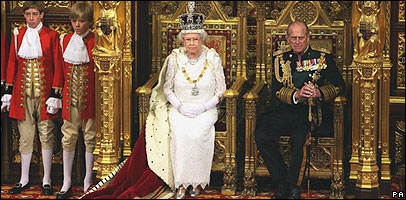Something positive for a change?
 It's not often that this blog (or indeed, many others) praise government policy or legislation, so let's break a habit and give Ed Balls' 10 year children's plan a cautious welcome. Some of it, inevitably, is old measures being re-announced and given a lick of new paint, and some of the reviews seem to be happening just for the sake of it, but for the most part the new initiatives proposed for example on money for new playgrounds and youth centres are long overdue.
It's not often that this blog (or indeed, many others) praise government policy or legislation, so let's break a habit and give Ed Balls' 10 year children's plan a cautious welcome. Some of it, inevitably, is old measures being re-announced and given a lick of new paint, and some of the reviews seem to be happening just for the sake of it, but for the most part the new initiatives proposed for example on money for new playgrounds and youth centres are long overdue.The SATs testing regime, which over the years has become vastly more important than they really should be, and attracted the ire of teachers as a result, is to be looked into if a pilot of flexible testing that has shown favourable results so far reports in the affirmative. More important, and understandably overlooked has been the development of teaching to the test, which becomes much more of an issue post 14, where almost everything not likely to be on the exam paper is discarded and simply not taught. Far from being based around learning, lessons are being turned into endless repetitions of facts, and in some cases subjects are no longer even resembling what they once were supposed to be teaching. It seems unlikely this will be changed when such ambitious and most likely unachievable targets as 90% of students getting 5 A-Cs at GCSEs by 2020 are still being considered.
More favourable are the well-rehearsed recommendations for schools to become centres of the local community, with social workers, police, libraries and sports hall all being available in one location making good sense. The insistence sadly on the continuation of the academy program, the results from which have so far been less than conclusive, with Lord Rothermere and even BAE Systems considering sponsoring such schools, but not any Oxbridge institutions as the government hoped, undermines it somewhat. Also yet to be explained is how this will function in reality, with the funding necessary for such err, centralisation, yet to be forthcoming.
Also promising are the proposals on parental involvement and on one to one tutoring, which are vital if underachievers are to be focused on and given the help when they need it most. Teachers can no longer be relied upon to do everything - parental attachment and interest into what their children are doing is often stifled simply by how kids hating talking about what they do at school, or at least how some do. The policy on reintroducing foreign languages at an early age, rather than starting them at some point in the middle of schooling is also a sound one. Trying to interest a class of 28 14-year-olds in speaking French or German is a little like attempting to teach a fish to ride a bicycle - pointless and cruel. The whole reason why those in continental Europe have been so successful in teaching English is that they start early, while with our advantage of speaking it in the first place we imagine ourselves to be superior and not needing to bother with other languages when it's a skill that's as vital as ever.
Some of this might be undermined if the government doesn't drop its ideation about schooling being compulsory until 18, or at least until it properly sorts out secondary education from its current woes over the divide between the academic and vocational routes. Tomlinson's recent report might have achieved it, and the introduction of the new diplomas might also, but I'm not holding my breath over that. Of all the things the tabloids decided to pick up upon from the report, the one they did was that "yobs" who said sorry would get off scot free, or something similar to that effect. The report actually suggests "restorative justice" to deal with first-time offenders, getting them to meet with those who they offended against, i.e. supermarket managers or similar if they shoplifted, the owners of the house they damaged if it was vandalism etc, schemes which have already been operating in some areas for a while and which have been on the whole a success. It's not going to apply to those who assault people or otherwise, who'll still get charged. As always, reporting some scandalous new insult to justice comes above the actual reality.
On the whole though it was a decent package which with minor changes would have been a lot better, such as the abandonment of the child database, ContactPoint. It was certainly far more authoritative than anything the Conservatives have come up within years, whose main policy up until Blair left was supporting whatever he did, but then the most annoying MP in the Commons in the form of Michael Gove was never going to say anything that might be considered complimentary. Ed Balls it seems is a lot better at putting policies together than actually advising Brown on what to do in the here and now.
Labels: compulsory education, Ed Balls, education, Michael Gove, the children's plan



